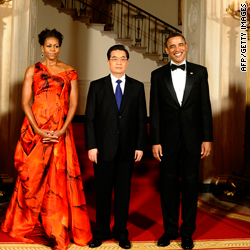Truth Vibrations
New member


[video]http://cnn.com/video/?/video/politics/2011/01/20/sotvo.us.china.state.dinner.cnn[/video]
Washington (CNN) -- After all the niceties of a state dinner at the White House, the reception Chinese President Hu Jintao receives on Capitol Hill Thursday may be a bit chilly in comparison.
Hu is scheduled to meet separately with Senate Majority Leader Harry Reid and House Speaker John Boehner. Neither man attended Wednesday night's dinner in honor of the Chinese leader.
Reid called Hu a "dictator" in a Tuesday television interview, but quickly recanted his words.
"Maybe I shouldn't have said dictator, but they have a different type of government than we have and that is understatement."
A spokesman for Reid expounded on his comments.
"Obviously, he believes strongly in the American political system and our form of government," Jon Summers said. "He also believes that it is important for us to continue our dialogue with the Chinese government about a wide range of issues which are critical to both countries, including our economy, Iran, North Korea."
Senate Republican Leader Mitch McConnell also did not attend the state dinner. House Minority Leader Nancy Pelosi did, despite being a vocal critic of China on human rights issues.
U.S. President Barack Obama stressed common interests between the nations while toasting the Chinese leader at the White House.
"While it's easier to focus on our differences of culture and perspective, let us never forget the values that our people share," Obama said while raising a glass to Hu.
"A reverence for family, the belief that with education and hard work and sacrifice, the future is what we make of it and, most of all, our desire to give our children a better life," Obama said, enumerating what he called common values between the U.S. and China in toasting Hu.
Hu, toasting Obama at the first formal state dinner for China in 13 years, praised the U.S. president for bringing the two countries closer together.
"In recent years, particularly over the last two years since President Obama took office, China-U.S. relations have made strong headway," Hu said.
"We have increased exchanges in cooperation in a wide range of areas, maintained close communication and coordination on major international and regional issues, and played a positive role in promoting peace, stability and prosperity in the Asia Pacific region and the whole world."
Hu said that he had reached important agreement with Obama during his visit.
"We agreed that our two countries should increase contacts at the top and other levels, strengthen strategic mutual trust through dialogue and communication, intensify exchanges and cooperation in all fields, and step up communication and coordination on international and regional issues," he said.
Earlier Wednesday, Obama and Hu met behind closed doors for several hours as top officials from both countries worked to address issues tied to the global economic crisis, international security, the environment and human rights.
Obama administration officials used the president's meeting with Hu to highlight economic progress between the two countries, announcing Beijing's approval of $45 billion in new contracts for U.S. companies to export goods to China. The contracts will support an estimated 235,000 American jobs, according to the White House.
Human rights remained a key sticking point for the two men. The United States has objected for decades to, among other things, China's handling of Tibet and political dissidents such as Nobel Peace Prize Laureate Liu Xiaobo, who remains in prison.
Obama on Wednesday defended his administration's decision to engage with China despite those differences, pointing out that "China has a different political system than we do" and is at a "different stage of development."
"I have been very candid with President Hu about these issues," Obama told reporters, and "occasionally, they are a source of tension."
But "we can engage and discuss these issues in a frank and candid way," he said.
Hu defended his country's human rights record, arguing that "China recognizes and also respects the universality of human rights." At the same time, he said, it is important to account for "different national circumstances."
"We will continue our efforts to improve the lives of the Chinese people" and promote "democracy and the rule of law," he said. At the same time, Beijing is willing to engage with Washington on the basis of "mutual respect" and the principle of "noninterference" in domestic affairs.
Hu started his three-day trip to the United States on Tuesday afternoon.
The formal state dinner for Hu on Wednesday evening is the third such occasion of his administration.
Among the 225 dignitaries who attended were former presidents Jimmy Carter and Bill Clinton. Former secretaries of state Madeleine Albright, George Schultz and Henry Kissinger were also at the dinner.
The last White House state dinner for China was in October 1997.
